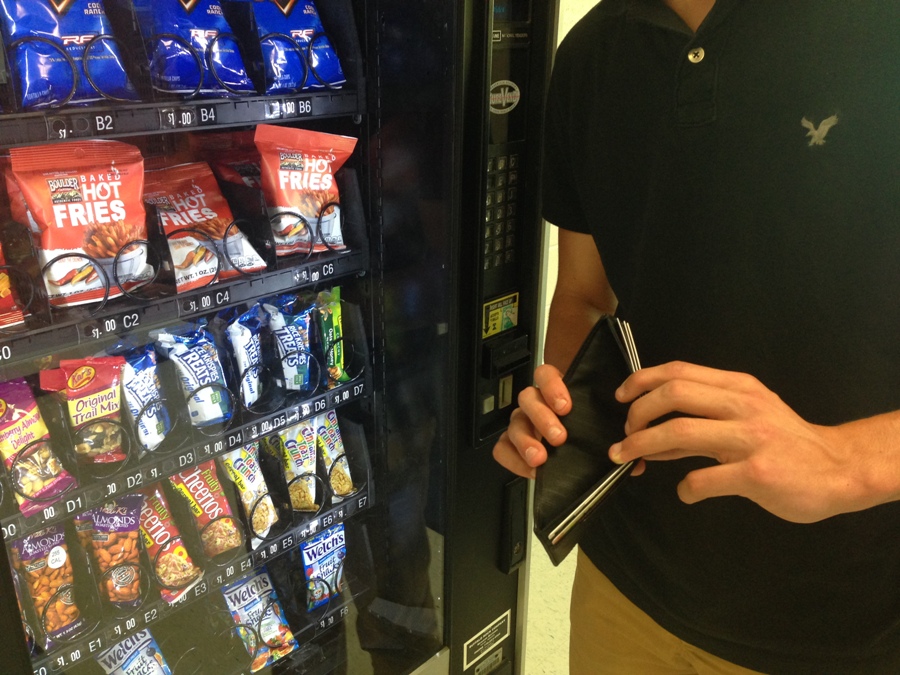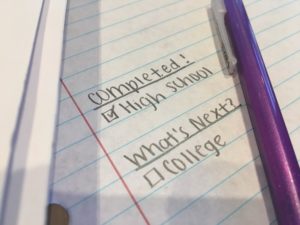Will students be able to ‘change’ their ways?
Students recognize less-than par spending and saving habits
A student intends to purchase a snack from the 700 hall vending machine, but when reaches to pull out a one dollar bill, he finds that he realizes he has no money to spend. According to many students, including freshman Olivia Wernecke, food is one of the main attractions for students’ wallets. “It’s definitely easiest for Starr’s Mill students to spend money on food because it’s something for them to do with friends. They take the one minute drive from the school parking lot to Chick-fil-a and they sit down and socialize,” Wernecke said.
May 11, 2017
When senior Johanna Schneider leaves school, everyday she and many other students are tempted to spend their money on the one-mile-away Chick-fil-a restaurant located off of highway 74 or other fast-food establishments. In fact, Schneider “typically spends most of [her] money on food,” Schneider said.
Schneider and many other students will agree that it’s terrifyingly easy to blow through money while hanging out with friends or satisfying an after-school craving.
But in order to satisfy these wants, students must have a source of money they can use to spend.
For many, including Schneider, the answer is a job. She works at a Peachtree City restaurant called Due South where she makes nine dollars an hour. Each time she receives her paycheck, Schneider must set aside $150 to keep her horse and what she has left is spent on food, clothes, and activities. The $150 she saves makes her think that she is “doing okay,” Schneider said. But Schneider’s ‘okay’ seems to be spoken with false bravado, as she still considers herself “an impulse buyer,” Schneider said.
Junior Anabelle Rockett doesn’t consider herself quick to spend but she knows many of her peers are. “Most people my age are impulse buyers, especially when it comes to indulging on food and activities,” Rockett said. But Rockett sees herself as an exception. “I usually save my [allowance] money and only buy what I really need,” Rockett said.
Perhaps it’s Rockett’s job occupation that really makes a difference when looking at her pockets. “I work for the Mart in Atlanta five times a year for a week at a time. During the time I’m working, I model for different clothing lines and help around the showroom,” Rockett said. Instead of being paid in money, Rockett is paid in clothes. Since she can deduct the cost of clothes from her monthly budget, it allows her allowance to stretch for a longer period of time, especially for items like food.
Rockett’s successful stretch of funds can also be due to her parents’ spending and saving habits and their influence on her. “My parents are really good about budgeting,” Rockett said. “We always buy the necessary things first and I only spend a certain amount a week.”
In addition to self-imposing a spending quota, students at the Mill have several other tactics to stall burning holes in their pockets. Senior Luke Ninneman said that he “always researches stuff to get the lowest price before spending [his] money,” Ninneman said. He is also a coupon advocate and at his job, Truett’s Luau, he receives “a bunch of coupons to use at Chick-fil-A to save money.”
One of the reasons that Ninneman remains so cautious of his spending is because his check card turned into a negative balance. “I told myself I would never do that again,” Ninneman said.
Many would view Ninneman’s check experience as a type of a horror story and it’s stories like his that make freshman Olivia Wernecke cautious of blindly entering a money vacuum. Now, whenever she considers to make a purchase, a train of thoughts rolls through her head. “When I’m thinking about buying something, I think about what I could use it for, or what I have that I can wear it with,” Wernecke said. If I don’t have any rationale to buy it, I won’t.”
Schneider has a more team-work enthused tactic. “I always take a friend with me when I go shopping. This way my friend can tell me if [what I want to buy] is worth it or not,” Schneider said.
Similar to Rockett, Ninneman’s parents “don’t like spending their money on pointless things,” Ninneman said. His parents make him and his sister pay for most transactions, with the exception of big ticket items like insurance and phone bills. Though it can make the amount of money he has suffer compared to his peers’ he thinks “that it taught [him] to be careful with [his] money too,” Ninneman said. “My peers are given a lot of money by their parents compared to me, and I feel like that [is what makes them] big spenders.”
But what is a big spender? A better question may be what makes someone a smart spender. Wernecke expressed that “a responsible spender is someone who thinks before they spend their money,” Wernecke said. “They think about if the item they are looking to buy is a necessity or just a want.”
Schneider’s definition of what makes a responsible spender seems to be similar to Wernecke, Ninnneman, and Rockett’s. “A responsible spender is someone who only spends money on necessities, and saves often,” Schneider said.
For many, saving remains easier said than done. “I would consider myself a responsible spender, most of the time,” Wernecke said, but even she has doubts. “Everyone has those times when they are with their friends and they have all this money and they say ‘Oh this is only $8 that’s nothing. I’m gonna get it!’ [and they forget that] all those eight dollar spendings add up.”
According to economics teacher Mark DeCourcy, it’s important to start saving early. When he was a teenager he “did a good amount of spending,” DeCourcy said. “I realized I needed to start saving when I was in my twenties and when I started a family. I figured, ‘Hey, I should start saving for the kids, a house, and other future plans’.”
In the classroom, part of the economics curriculum DeCourcy must cover are foundationary terms like demand deposits and interest rates. “In each class I ask my students ‘How many of you have savings accounts?’ and everybody raises their hand. I think most everyone has a savings account, but as soon as I ask about their interest rates, everybody drops their hands. Nobody knows their interest rate,” DeCourcy said.
This is a problem because without knowing how much money students are saving, it’s hard for them to plan for the future, and the importance of future plans and goals is taken with high regard by DeCourcy. “You have to have a plan to meet your goals, and that plan is good saving. If you want to buy a house, if you want to buy a car, if you want more Chick-fil-a, or even afford to drink more coffee, you have to have the funds for it,” DeCourcy said.








